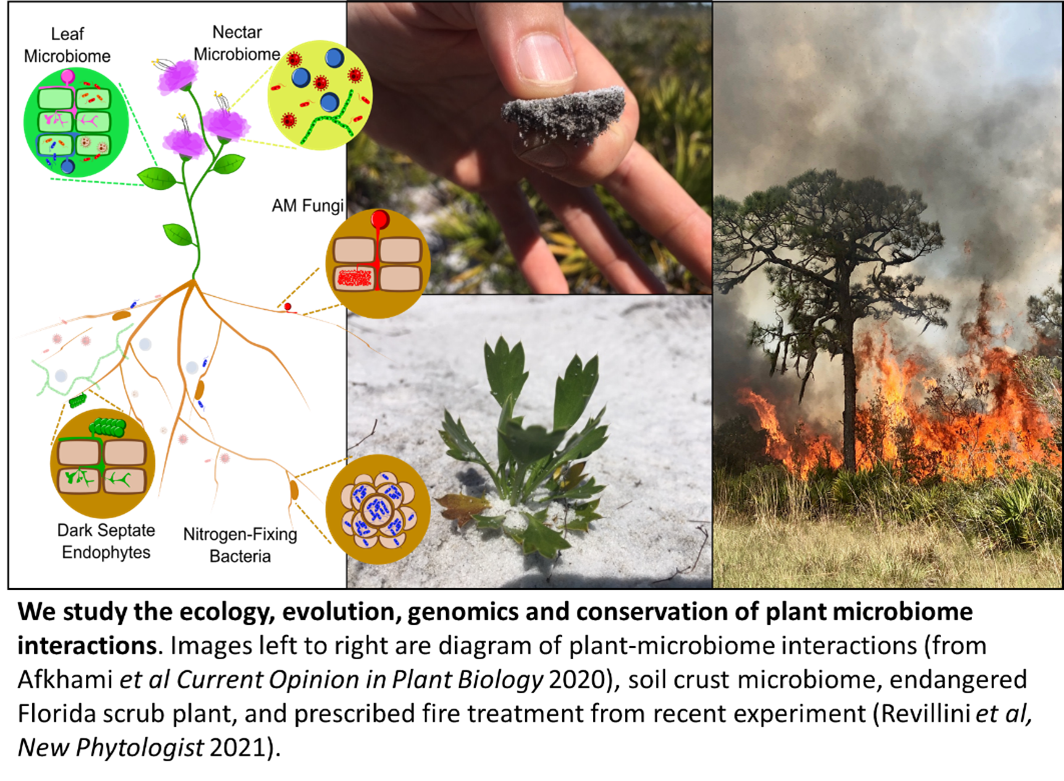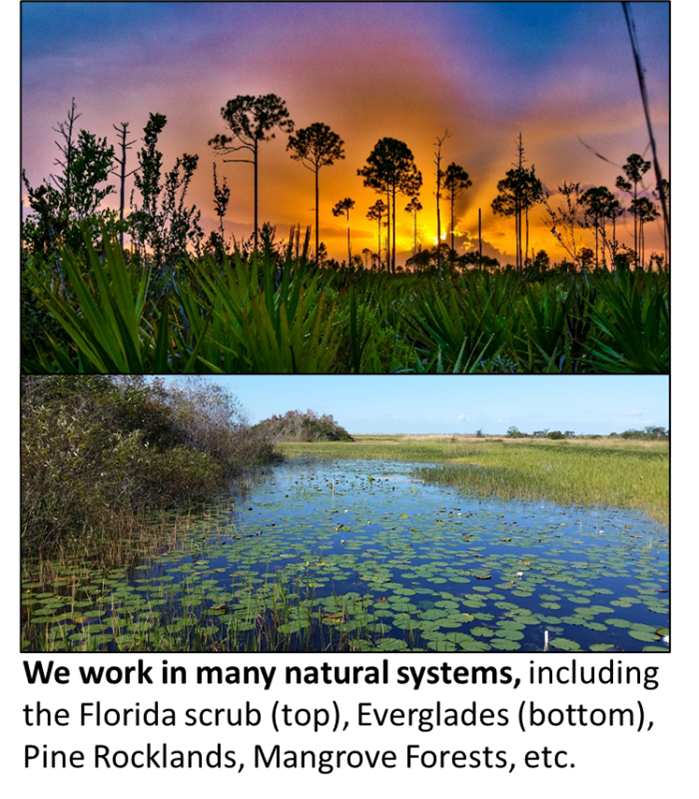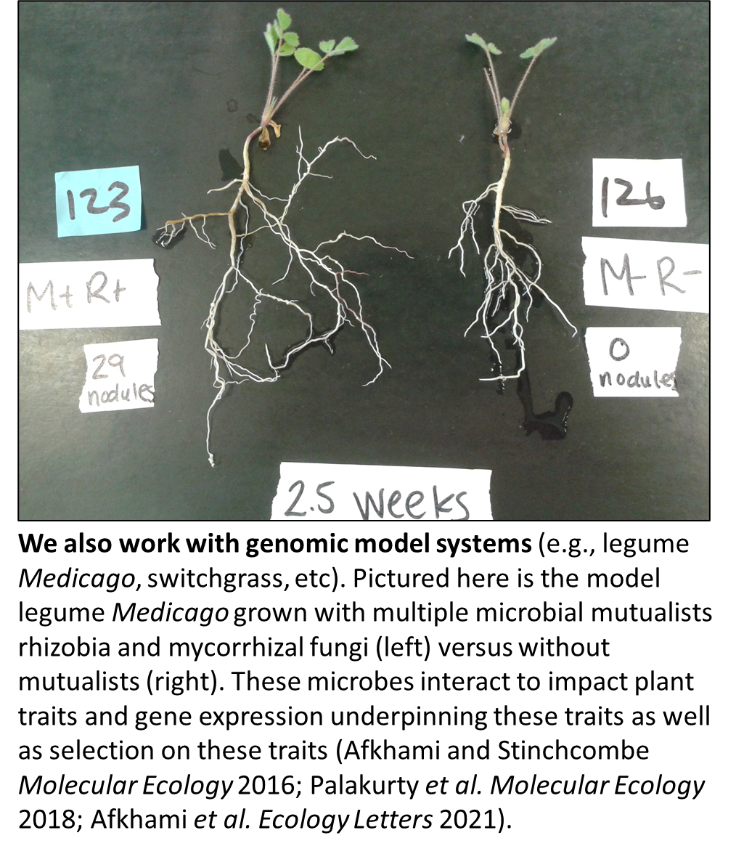
The Afkhami lab at the University of Miami, Florida studies the ecology, evolution, genomics and conservation of species interactions at scales ranging from genes to communities. We use wide range of approaches, including field and greenhouse experiments, surveys, modeling, bioinformatics, and laboratory-based molecular methods and genomics. While our research spans all types of interactions and we are interested in a diversity of systems, we most often study positive species associations in plant-microbial mutualisms (e.g., rhizobia, mycorrhizal fungi, and fungal endophytes) and microbiome-wide interactions. Our research is aimed at understanding the mechanisms underlying how microbiomes and mutualisms of all types affect the broader questions of ecology, evolution, and genomics as well as applied goals for sustainable agriculture and conservation.
 Some recent questions people in Afkhami lab have investigated include: “How do microbial landscapes impact plant distributions?”, “Can mutualism cause range expansions into new habitats?”, “What are the consequences of microbial mutualisms for plant and herbivore community diversity?”, “How do multispecies mutualisms affect fitness, what is the genomic basis of these effects, and what are the consequences for evolutionary trajectories?”, “How can single-cell transcriptomics inform inter-microbial interaction dynamics?”, How does habitat fragmentation and edge effects impact microbial communities and their consequences for plants?”, “How does phyllosphere microbiome diversity impact plant productivity, and can these microbiomes ameliorate the stress of sea level rise for a key foundation species (mangroves)?”, “What is the role of microbiomes in conservation and restoration of local imperiled habitats, such as the Everglades Tree Islands?”, and “Can we improve sustainable agriculture through use of natural species interactions and how does domestication impact microbiome assembly and their interactions with crop plants?”.
Some recent questions people in Afkhami lab have investigated include: “How do microbial landscapes impact plant distributions?”, “Can mutualism cause range expansions into new habitats?”, “What are the consequences of microbial mutualisms for plant and herbivore community diversity?”, “How do multispecies mutualisms affect fitness, what is the genomic basis of these effects, and what are the consequences for evolutionary trajectories?”, “How can single-cell transcriptomics inform inter-microbial interaction dynamics?”, How does habitat fragmentation and edge effects impact microbial communities and their consequences for plants?”, “How does phyllosphere microbiome diversity impact plant productivity, and can these microbiomes ameliorate the stress of sea level rise for a key foundation species (mangroves)?”, “What is the role of microbiomes in conservation and restoration of local imperiled habitats, such as the Everglades Tree Islands?”, and “Can we improve sustainable agriculture through use of natural species interactions and how does domestication impact microbiome assembly and their interactions with crop plants?”.
~~~
Prospective Graduate Students
 New students will be encouraged to develop their own research interests that expand upon current projects in the lab or start a new line of inquiry about plants and microbiomes. Student projects and will have access to a diverse set of model and natural systems, including Archbold Biological Station (an internationally-renowned field station where we are conducting NSF-funded research — https://www.archbold-station.org/) and the Everglades where we collaborate with state agencies to understand microbial communities in restoration.
New students will be encouraged to develop their own research interests that expand upon current projects in the lab or start a new line of inquiry about plants and microbiomes. Student projects and will have access to a diverse set of model and natural systems, including Archbold Biological Station (an internationally-renowned field station where we are conducting NSF-funded research — https://www.archbold-station.org/) and the Everglades where we collaborate with state agencies to understand microbial communities in restoration.
SUPPORT~ Students in my lab receive tuition, stipend, research, and travel support as well as university-provided health benefits (medical, dental, and optical). Financial support comes from a mix of teaching assistantships, fellowships, and departmental and university funding. I also have supplemental funding available from grants and internal funds. Further, all previous graduate students in my lab and I have worked together to successfully obtain fellowship support for them (e.g., through National Science Foundation GRFPs, USDA NIFA Predoctoral Fellowship Program, McKnight Scholars Program, University of Miami Presidential/Maytag Fellowships, UM-Fairchild Botanical Gardens Fellowships, etc).
 HOW TO APPLY~ Interested students should learn more about our lab (check out other tabs on this website, look at some of our papers, etc), then contact me at michelle.afkhami@miami.edu with “Prospective Graduate Student” as the subject. The email should include the applicant’s (1) CV, (2) university transcripts (unofficial is fine), and (3) a short paragraph introducing themselves, their research interests, and experiences. (4) Please also include a sample of scientific writing if possible. (This may be a published paper, manuscript, past research proposal, undergrad thesis, class paper, etc.)
HOW TO APPLY~ Interested students should learn more about our lab (check out other tabs on this website, look at some of our papers, etc), then contact me at michelle.afkhami@miami.edu with “Prospective Graduate Student” as the subject. The email should include the applicant’s (1) CV, (2) university transcripts (unofficial is fine), and (3) a short paragraph introducing themselves, their research interests, and experiences. (4) Please also include a sample of scientific writing if possible. (This may be a published paper, manuscript, past research proposal, undergrad thesis, class paper, etc.)
While applicants may contact me at any time prior to the Dec 1 application deadline, priority will be given to student who email by Oct 14th (and emails prior to Oct 14th are strongly encouraged). The goal is to allow time for us to discuss the program, the lab, and potential projects before applications are due; I will schedule zoom meetings with top candidates to talk in more detail.
Afkhami lab strives to be a welcoming and inclusive community, and I encourage applications from students from groups that have been traditionally underrepresented or excluded from academia.
